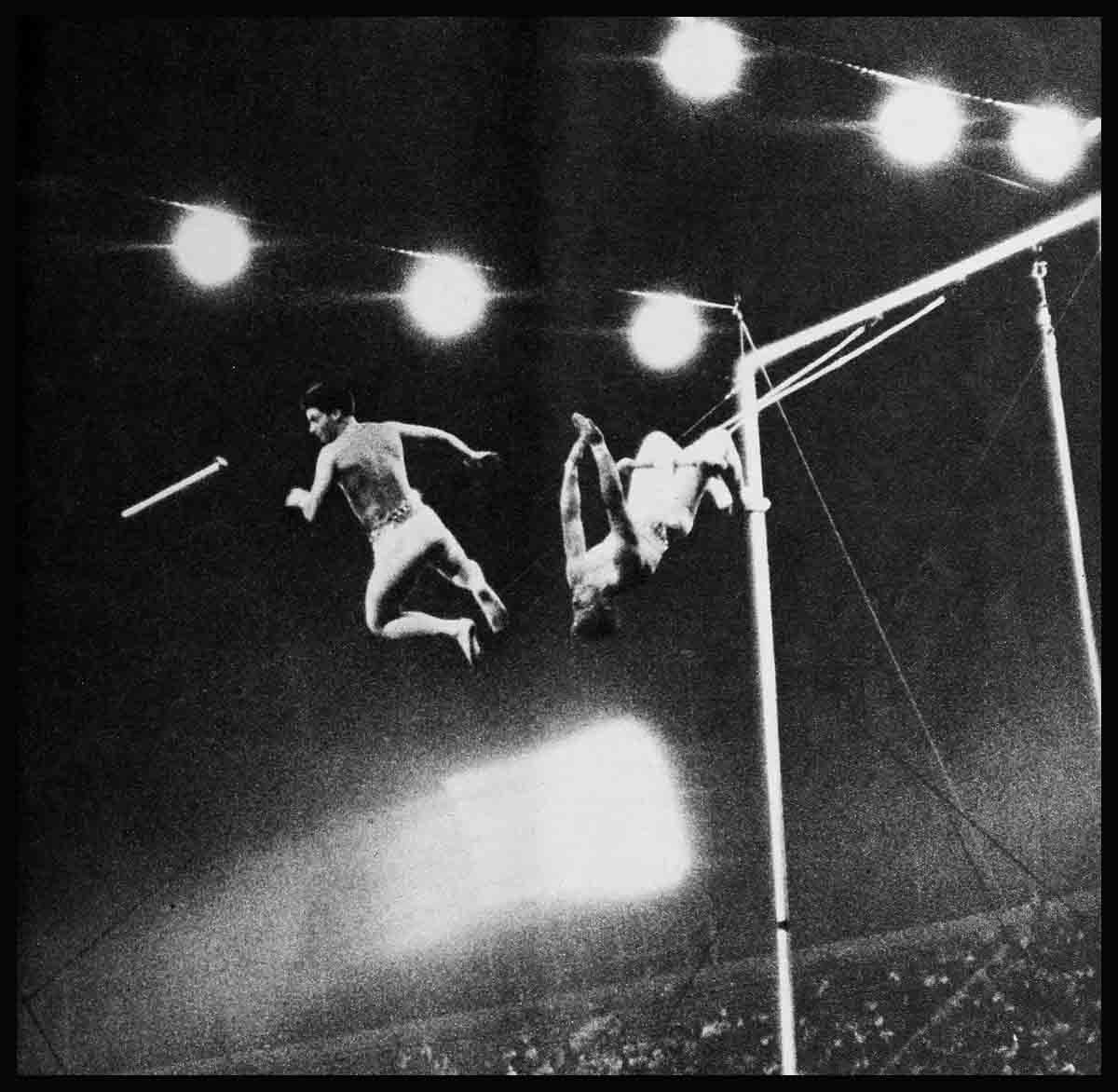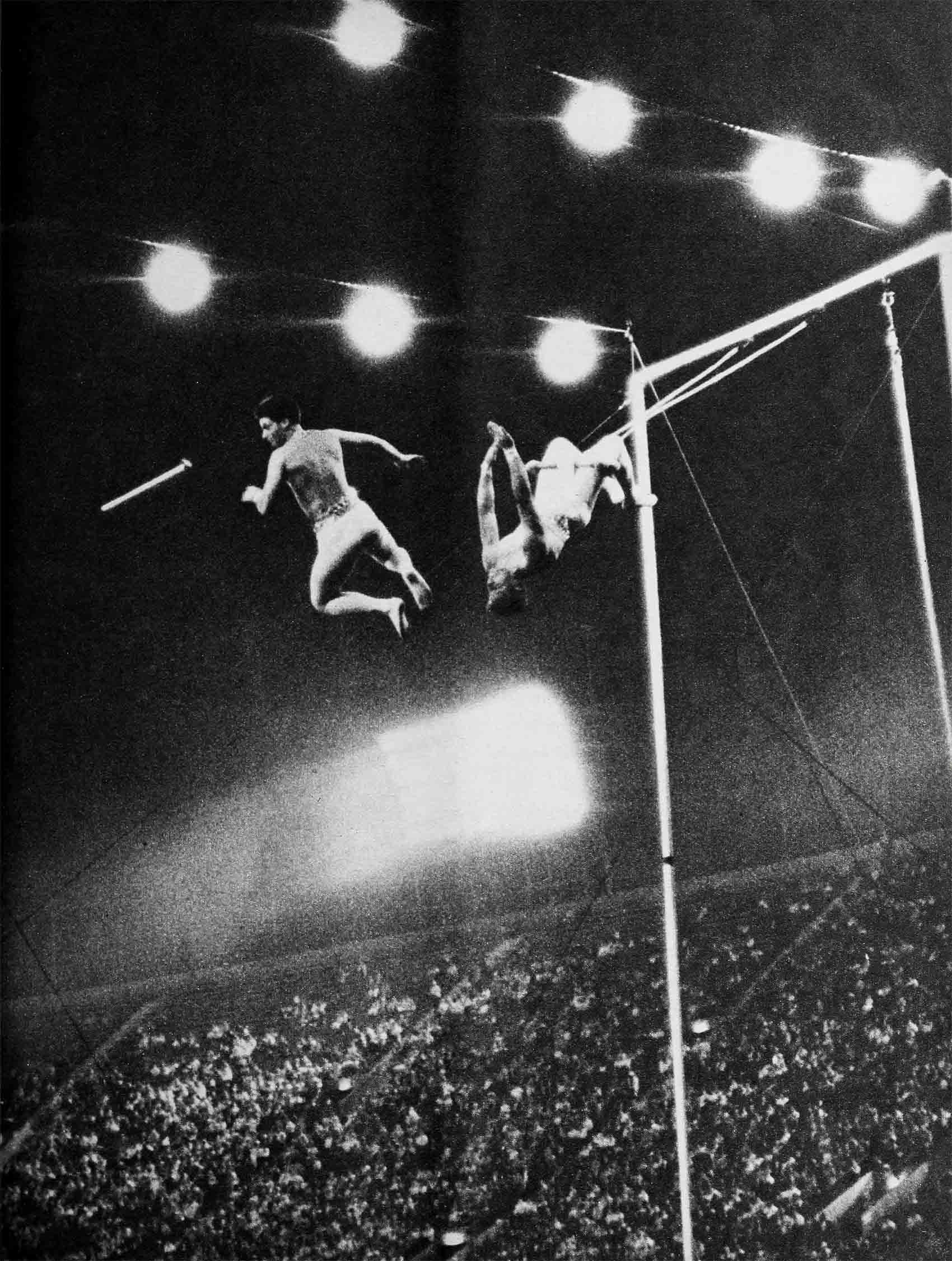
Ricky Nelson-Why Dare Death?
A round moon and a skyful of stars hung like a jeweled canopy over the Los Angeles Memorial Coliseum. A huge crowd had cheered the first part of the All-Stars charity football game. Now, between halves, lights flooded one end of the stadium and picked out a contraption of bars and ropes. The announcer boomed, “Ladies and Gentlemen, the Flying Viennas, Del and Babs Graham, and the Nelson brothers, David and Rick, will perform their thrilling aerial act for your pleasure . . . their death-defying challenge to the laws of gravity . . . and so I give you. . . .”
Amid wild cheers, four slim bodies in skin-clinging tights, moved into the spotlight. Royal blue capes slung over their shoulders shimmered and glistened. With the supple ease of tigers they walked to the trapeze rigging, bowed to the roaring, stamping audience, and in one graceful movement, flung off their capes and handed them to a man standing nearby.
On one side of the rigging, David pulled himself up a rope, hand over hand, till he reached the catcher’s bar. On the other, the Grahams and Rick climbed a rope ladder until they reached the pedestal board. Here, each would wait in turn for a chance to dare death by flying through the air.
Rick took hold of his trapeze bar. Across the vast expanse, David was ready for him, leaning over backward on the catcher’s bar until he was hanging only by the knees.
Rick swung back and forth a few times, making a wider and wider arc each time . . . then let go of his bar . . . somersaulted into space . . . and into the outstretched hands of his brother.

A crazy kid
Rick, his hands still in David’s, swung back and forth one more time . . . then he left the security of his brother’s hold. With split-second precision, he caught his swinging bar . . . and propelled himself back to the pedestal board. They did it again, with variations, and in the grandstands people sat glued to their seats, hardly daring to breathe. The bodies whirled and hurled high above them, forty feet off the ground. Under them, a net, true—but you can land wrong in a net— and still be seriously, even fatally, hurt.
The finish was spectacular. One by one, the four performers dived down thirty-two feet into the net. The audience screamed with relief and admiration. They caught the net’s edge with their hands, flipped over the sides, landed lightly on their feet. They bowed once more, put on their satin capes and walked away, silhouetted in the glowing spotlight.
And people, letting out long-held breaths, said “Whew! What a crazy kid. Why in the world does a star like Rick Nelson take his life in his hands?”
A good question. For that matter, why does he take the other calculated risks that no one can talk him out of? Why does he tempt fate by bull-dogging steers? Or ski when conditions are so treacherous that even the pros won’t go out on the slopes? Or water-ski in the roughest of surfs? Or drive fast racing cars?
People ask “Why?” and give themselves the simplest of answers. He’s brave, he’s not frightened by physical danger. He’s young, he has a well-coordinated body, good nerves and no fears.
But then you remember the spine-chilling incident of the Demolition Derby, where Rick drove so wildly and went so far asking for trouble that he got it! He came so close to Death, flirting outrageously with her, that it very nearly turned out to be his last romance.
Rick was on location in Arizona for “Rio Bravo” when he heard about the Demolition Derby that the local disc jockies were putting on. It was one of those wild “races for survival.” The cars are stripped down to metal frames with motors. Not one excess part is left on them. The idea is to knock the other fellow out of the race by crashing him wherever his heap is most vulnerable. Last car able to run on its own power is the winner.
Rick told Joe Byrne, his stand-in, “That’s for me. What do you say we go?” Joe was for it, too. They told nobody on the location set, knowing they’d be forbidden to go. And they made the deejays swear not to reveal that the driver of car number 2 was Rick Nelson, because Rick made it a point to go into competition under assumed names. If he came out tops, it had to be because he was the better athlete, he didn’t want the attention focused on Rick Nelson the star.

Flames shot from the car
By early that day, word got around. A dozen metal scarecrows were battling it out on the course, and the stands were filled with a shrieking mob who’d heard that the wild man in car number 2 was Rick Nelson. Brakes squealed, rubber tires burned, metal frames crashed magnificently and after a time the finalists were—car number 2 and its opponent.
Rick revved up his motor and headed for the heap that stood between him and victory. To the roaring crowd it looked like he was going in to hit it on a sideswipe and knock it out of commission. At the last second, as though the excitement got out of control for him, he came on for a complete victory. He rammed the other broadside—knocked it out of the race—and knocked the wind out of himself.
In the same instant, he saw flames shooting from the front of his car, and the smoke pour out black and thick. He struggled to unhook his safety belt knowing that any second now the tank could explode. It wouldn’t come open. Then, just in time, some men came rushing on to the track and yanked him out of the death trap.
The newspapers made a big deal of the story. They compared him to Jimmy Dean. They said that he, like Jimmy, had a “death wish.” Rick shrugged it off as a lot of nonsense. Maybe he’d been a little foolhardy, but that’s all. The papers were way out of line, implying that other stuff.
“But why did you do it?” friends asked.
Again the shrug. A lot of reasons. Excitement . . . confidence in his own skill at the wheel . and worked his way up to what he considered the clincher, the real McCoy of a reason—the end of the discussion. He said, “I guess I wanted to prove to the crowd that I wasn’t afraid.” “Afraid of what?” Rick just shrugged his shoulders again.
It was on this same Arizona trip that he acquired a horse and also fell in love with the art of bullfighting. Cars became something to enjoy, not to race. He threw himself into the new interest with typical wholeheartedness, read everything he could lay his hands on, studied technique with an expert and got himself a practice bull. Because this is the key to the Nelson approach—if you learn something, you learn all of it. Flamenco guitar was a natural offshoot from the bullfighting and he started studying the instrument with Vincente Gomez, one of the greatest.
But the guitar was only a breather for those who worried over Rick’s safety. The big love affair developed next between him and the trapeze. Again people wondered, “Why does he do it?” He had been so close to death that day at the Demolition Derby. Why, after such a near miss, did he have to take worse chances?
It was different in David’s case, he was working on “The Big Circus.” The film’s technical advisors were the famous Flying Viennas and David. getting the feeling of his role, began working out with them. He found he not only loved this thrilling occupation, but he was good at it, beautifully co-ordinated.
He was working out with Del and Babs Graham—the Flying Viennas—when Rick wandered over to watch. Say, he decided, this looks like fun—and he tried it. From the start, Dave encouraged him. He passed on everything the Grahams had taught him, and worked out with him until Rick, too, was soaring in space.
Now the brothers are closer than ever—every time Rick flies through the air he is literally putting his life into Dave’s hands. But they refuse to think of it in those terms, or count the near misses. As Rick puts it, “When. you do anything requiring skill and courage, you first learn how to do it, then you work hard at it, then you study the odds; and after you know the odds, you dismiss them.’
Rick has dismissed the odds so often, you begin wondering to whom he is trying to prove he’s not afraid to do the things he does. He proves it to trembling audiences every time he goes flying out into space on the trapeze. He has proved it to his family, his friends, girlfriends.
Perhaps the only one to whom he hasn’t proved it, yet, is himself . . . and maybe this is the answer. Like every boy growing into manhood, Rick must feel the need to prove himself, so he has to invent danger in order to conquer fear.
Recently, Rick has been quietly dating Edith Roder, a pretty airline hostess, and people who have seen them together insist that this could develop into a really serious romance. Perhaps what draws these two together is that Edith, in her day by day contact with pilots, has met other men with the same drives as Rick and can give him the understanding that other girls cannot.
Yet, how must a girl feel if the man she cares for lives in constant danger? What can she do about it? Perhaps Edith has already learned that she can’t, for a moment, try to change him; that the only things she can do is try to understand.
Perhaps she already understands that everybody has a secret fear and that each person has to find his own way to conquer this fear. Sometimes there’s no danger involved. The things a woman is afraid of are often simple—like meeting new people, fear of heights, being alone. A woman tries to conquer whatever she’s afraid of by searching for security.
But with a man it’s different—and with someone like Rick, there is often a mortal risk. Why does Rick dare death? Often, a man will find that he can’t admit the thing he’s really afraid of and so he must give fear a different face. The real terror is hidden. Is there some deep-seated resentment, some long-forgotten frustration, some urge so deeply-buried that even Rick is not conscious of it? Or maybe the answer to Rick is simpler. Maybe it’s that sometimes a man conquers fear by risking everything to prove that the fear really isn’t there. Maybe a man dares death to prove that he is a man.
—BY BEATRICE MARCH
See Rick and David on ABC-TV, Wednesdays, 8:30-9 p.m., EDT in “The Adventures of Ozzie and Harriet.” Be sure to see Rick in “The Wackiest Ship in the Army” for Col. He records for Imperial.
It is a quote. PHOTOPLAY MAGAZINE NOVEMBER 1960




